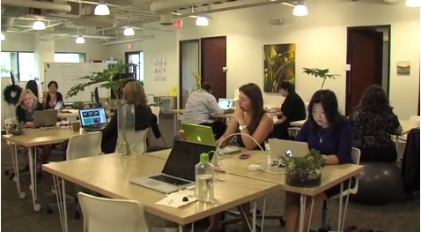“Few resources are as underutilized in these ecosystems as women: if women are not actively engaged as entrepreneurs, the job creation capacity of half the world’s population is lost.”
That’s the hard-hitting word from the Global Entrepreneurship Monitor 2012 Women’s Report. It highlights the critical importance of women in the workplace and the need to build “local ecosystems”, to better support female workers and entrepreneurs in business. Why? To strengthen the global economy.
Yet, in nearly every economy around the world there are fewer female than male entrepreneurs.
This trend exists for many reasons – motherhood, social expectations, religious customs, lack of opportunity, fear of failure, the glass ceiling. There is a desperate need to develop support networks. In particular, the report cites: “Women need to be encouraged to create networks and make connections with people who can provide advice and services.”
Enter the women-only workspace.
The flexible workspace industry is reacting to women’s needs and their aspirations to run businesses by offering women-only workspaces. As a female small business owner, I find this concept interesting. My initial thought was, “Why exclude men and therefore potential business opportunities?”
I put this question to Jennifer Brooke of the UK’s Business Centre Association.
“Working in a female-only environment doesn’t mean those workers don’t conduct business with men outside of their office – and many women-only workspaces allow businessmen into the workplace for meetings,” she pointed out.
“These spaces are important. They are answering a need, and providing additional support for female business owners who, for their own reasons, don’t wish to work in a mixed environment. The flexible workspace sector is well-placed to facilitate specific needs, and the surge in women-only workspaces is one example of how precisely and timely the industry can react. These spaces provide a comfortable setting for female members to work happily and productively, allowing them to progress their businesses and benefit the community, by providing products, services or creating jobs. This represents an enormous opportunity for economical growth both on a local and national scale.”
“Affinity”
One coworking space, Hera Hub (pictured), addresses this need by marketing directly to women. The space is spa-like, with fresh flowers, running water and scented rooms. It’s a female focused coworking space, but not exclusive – both men and women can apply.
“Many women running small businesses often have to juggle family life, and therefore feel an affinity with other women in the same situation,” explained Felena Hanson, founder of Hera Hub. “A supportive environment where women feel they easily relate to others helps get to that point in the relationship where they know, like, and trust the other person. They are therefore more likely to ask for feedback or refer business.”
Comfort, support and safety: these are some of the most basic yet essential motivational requirements outlined by Maslow’s Hierarchy of Needs, and these support networks are helping many female business owners and workers to flourish.
“Members know they are in a safe space with a trusted group of colleagues surrounding them,” added Felena. “Many of our members are well-connected and quick to share contacts across their networks – with both men and women.”
Niche market
The flexible workspace industry is enriched with a network of niche target markets. As Victoria Arnold points out, founder of Desk Union, the concept is akin to a niche incubator or workspace – tech, mobile, environmental, finance or otherwise.
“In business, women do provide an incredible support network to one another and may hold a different outlook to their male counterparts,” Victoria said. “Personally, I wouldn’t choose to work in a female only space because I enjoy the dynamics of a mixed gender workspace. If it works for some people though, who are we to judge?
“In terms of marketing, however, I do think these spaces should be careful not to fall into selling a stereotype. After all, an office with fresh flowers and a gentle ambience is not a ‘must have’ for all women.”
The women-only concept is creating affinity with female entrepreneurs, and the trend is growing. Felena, for instance, plans to expand her network to 100 Hera Hubs by 2020. There is also explosive growth in women-owned businesses worldwide – a factor that is contributing to the rising trend for women-only workspaces.
The women-only concept, far from limiting business opportunities, can actually encourage more women into the workplace and into the business arena – creating more successful entrepreneurs, more jobs, and a healthier economy.
Ultimately, women use these spaces to get the job done. It’s not for everyone, myself included. But for a growing number of successful women out there, whether it’s for the support of a sisterhood or for the spa-like surroundings, it works. That’s a win-win for everyone.
Researched with help from Jemma Caldwell of Tanami


 Dr. Gleb Tsipursky – The Office Whisperer
Dr. Gleb Tsipursky – The Office Whisperer Nirit Cohen – WorkFutures
Nirit Cohen – WorkFutures Angela Howard – Culture Expert
Angela Howard – Culture Expert Drew Jones – Design & Innovation
Drew Jones – Design & Innovation Jonathan Price – CRE & Flex Expert
Jonathan Price – CRE & Flex Expert













